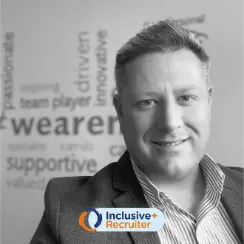
As the world continues to evolve, businesses must keep up with their employees' expectations more than ever before. As a result, companies are adopting new policies and practices to ensure they're doing everything in their power to attract and retain top talent. One of these long-fought for changes is equity, diversity & inclusion (ED&I).
It encompasses more than just gender, race and sexual orientation. It also includes things like age, culture, socio-economic background and more. There are many ways to measure the degree of diversity in a workplace but the most common is to begin with a thorough exploration of your business’ current workforce and challenges, so that you can identify the areas that you – and your employees – want to target and improve upon. The importance of having a diverse workforce in your business can't be overstated.
Why does it matter?
There are many benefits to having a diverse workforce, such as having access to a variety of different perspectives when it comes to finding solutions to problems. Diverse teams are more productive and innovative than homogeneous groups, as they can draw upon knowledge gleaned from their individual backgrounds to make decisions and communicate with clients and customers who may share similar characteristics with them, allowing your organisation to build deeper relationships and open up access to new markets and opportunities for growth.
Where should you begin?
It all stems from your recruitment process. A diverse recruitment process will ensure that you have a more representative workforce, which can help to improve your company culture and performance.
There are a few key things you can keep in mind during your recruitment process to make it more inclusive and ensure it remains open to wider pool of candidates:
Be mindful of the wording you use when creating a job description – ensure that the language you use is transparent and not targeted towards a specific age, gender or other demographics
Don’t just advertise the role in traditional media outlets – consider bringing your roles to career fairs for individuals who come from disadvantaged backgrounds or those who may struggle to find work normally, such as
Don’t just advertise the role to people who have already got experience in your industry. Offer work experience opportunities to young people or those who may have transferable skills
Create mentoring schemes with local colleges or universities so they can help you identify potential candidates
Offer flexible working hours, so that people with caring responsibilities can work part time or remotely if possible
Giving your team a reason to stay
A diverse recruitment process opens you up to more candidates, but it also benefits your business in other ways too. A more diverse workforce means a better team. This is especially true if you're looking for employees with different skillsets, as well as those who may have been overlooked by other companies due to their background or experience (e.g., older workers). It's important for everyone in the business to work well together - and having a mix of people from different backgrounds helps ensure this happens naturally.
It's important for existing employees too, as those who feel valued by their company are more likely to stay and work harder. Fostering an inclusive working environment can also lead to more productive, motivated and loyal members of staff. A diversity strategy can help you retain talent by promoting a positive culture where everyone feels comfortable bringing their whole selves to work. This leads to better employee engagement, which ultimately improves your bottom line.
It’s time to catch up
It’s important to give candidates equal opportunities. The best way to do this is through a fair and transparent application process. The benefits of a diverse workforce are well documented: they can be more productive and innovative as well as more profitable.
But what about your own recruitment process? Is it working for everyone who applies? If not, then why should someone apply for a job at your organisation?
If your business is thinking about beginning its ED&I journey to help you discover the answers to those questions, our free Insights Guide outlines everything you’ll need to assess to get started.
There’s always more to learn
While crucially important, the recruitment process is just the tip of the iceberg when it comes to ensuring that your business is set up for success to meet its ED&I goals. As an Inclusive+ Recruiter, NRL are committed to supporting our clients along the way to ensure they’re developing the right objectives for their business and are armed with the knowledge to tackle them – which is why we developed our monthly ED&I newsletter to share the latest updates and developments. If you’d like to receive a copy, simply connect with me and request to be signed up.

.png)




.jpg)

